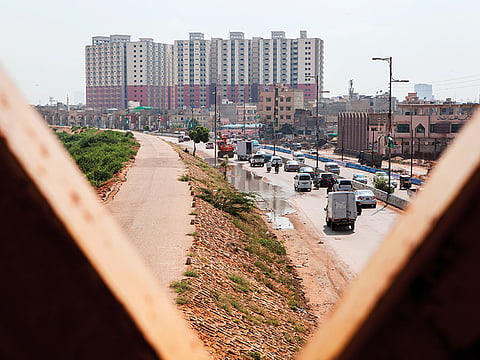Pakistan’s developers unfazed by recent price drops
They blame charged political situation rather than market fundamentals

Dubai: Pakistan’s developers are not going to get caught up thinking short-term.
That’s why they seem to be taking in their stride the near constant political turmoil, a relatively overvalued currency, and the fact that property values are down by nearly double-digits from what they were just under a year ago. And developers — whatever be their size — are keen to emphasise that these are only short-term hurdles to climb over.
That is why Zeeshan Zaki, Director at Karachi-based Saima Builders can say: “For quality developers and developments, there has been no shortage of demand. Projects continue to be sold regardless of the political turbulence … such is the shortage.
“Since 2011, property prices have gone up by 5-6 times and even higher in many cases. While this may sound extremely high, it is important to remember that it has come from an extremely undervalued position. And even today remains undervalued relative to its peers in the region.”
Non-resident Pakistani buyers have had much to do with demand spike since the start of the decade. It was also the time that developers started to favour sprawling gated communities, and which managed to pick up significant interest from buyers in the Gulf.
But a key component enabling the upturn was the soft Pakistani rupee for the better part of the decade. That is not the case now.
“The rupee remains overvalued from a trade perspective, and something that has been stated by the IMF,” said Sameer Lakhani, Managing Director of the consultancy Global Capital Partners. “The government thus far has been reluctant to devalue the currency, because they reckon structural reforms are needed rather than just a mere devaluation.
“However, if we are took at past performance, it is highly probable the currency will move lower within the next 12 months.”
Currently, a dollar fetches Rs105.38, but in summer this year had dropped to Rs108.09. The IMF in some of its recent pronouncements have suggested the currency is about 20 per cent overvalued.
Any devaluation move could turn into a boom time for the country’s developers, more so if overseas Pakistanis feel the recent drop in property values further improves their prospects.
Across all of the prime cities, recent months have seen corrections, in some instances quite sharp too. In the upscale areas, values are now down by 5-15 per cent, while in second-tier neighbourhoods, the hit has left quite a dent in values, down 20-25 per cent, according to market sources.
“The situation will remain somewhat turbulent on the economic front until the political situation stabilises,” said a developer. “Investors hate uncertainty and these appear to be uncertain times.”
It could be that the real estate market — and the wider economy — has to wait until after June 2018 before a clearer picture emerges. The next general elections are due then, and a clear mandate from voters should smoothen some of the rough edges on the political front.
Zaki, for one, remains convinced the property market has what it takes to take on the recent turbulences. “I maintain that property values have only just started to recede that too in select areas and predominantly because of the political situation in Pakistan,” he added. “Fundamentally, the country remains severely undersupplied in terms of quality housing, a situation that is expected to remain for much of the coming decade.”
Most developers are thinking in the longer term. Despite the price drops, the number of project launches have not seen receded. Market sources suggest that what is absent is the speculative buying, and that can only return when the political situation corrects itself.
“Until then, the property market will remain turbulent with a net downward bias,” said Lakhani. “From a medium term perspective, with prospects for financing opening up as banks start to offer mortgages, the outlook for the real estate sector does remain bright.” But if the speculative buyers are not picking realty, developers hope the non-resident Pakistani buyers would. “Overseas resident buying has increased significantly and has been less susceptible to politics,” said Furqan Hussain of the publicly listed Quice Industries, which recently ventured into property development. “A rupee devaluation is widely expected in the next few months, and for the domestic buyer this has already been factored in.
“But the recent downturn should be seen in perspective — there is very little of debt based development activity going on. And property buying through mortgages is still on the low side. The issue of repayments is not such a major concern.”
A snapshot of Pakistan property market’s recent performance
Property values are down by 5-10 per cent in since peaking in about May-June. In some of the more speculation prone areas, the declines have been wider.
But the flow of off-plan launches has not seen a tailing off. Market sources this pace will continue as demand far outweighs supply. There has not been much of a reduction in launch prices either.
As with the property market, stocks too have been hit by the political climate. The Pakistan stock market peaked in March and since then has corrected by 22 per cent, making it one of the worst performing emerging market this year.


